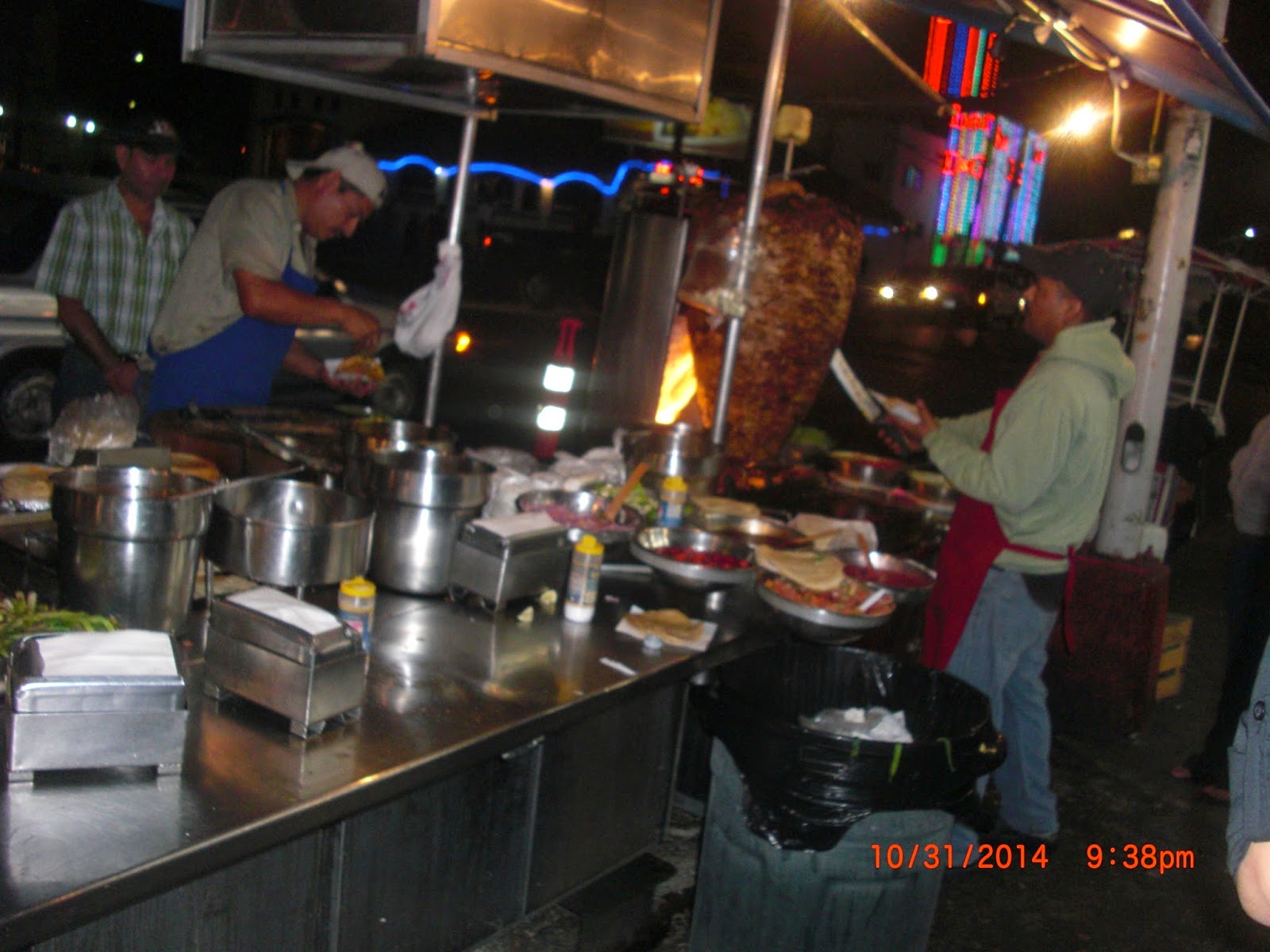My Spanish Notes |
|
Posted: 09 Nov 2014 06:29 AM PST
Once again, we're going to be talking about one of my favorite subjects, food. Somehow my Spanish has become inexplicably tied to food, but I love both of them, so no me voy a quejar (I'm not going to complain).
If you've never had a genuine Mexican taco, then you haven't lived. And one of best places to experience the joy a great Mexican taco can deliver is in the city of Tijuana. If you happen to be in San Diego, it's very easy to get to there, you just cross the San Diego border and there you are. Taco stands are everywhere in Tijuana, it's hard to turn a corner and not see a taco stand of some sort. There are basically two kinds of places to eat tacos, those that are more like restaurants with fixed locations. You walk up, pull up a chair or sit at a table and then order your tacos and enjoy. And there are the taco stands (puestos de tacos), that sit on a corner and get wheeled in and out everyday. The photo below is of my favorite taco stand.
Let's take a look at how these puestos work. As you can see by the photo above, there are lots of people just standing around. Why you ask? Let me explain.
Once you've chosen the puesto you want to eat at, you simply walk up to the puesto. You may have to navigate your way to the front of the puesto with your best con permiso (excuse me), but once you get there, this is what you'll see:
Then all you do is place your order with the cook:
I however two
I want two with everything
Of course you can order as many tacos as you want, I typically start with two and end up having eaten 3 or 4. They're more tasty and addictive then you think. Now, you may be wondering what is a taco "con todo"? You're average puesto de taco will typically have a collection of condiments that looks like this:
There's limón (Even though your Spanish book says limón means lemon, you'll get a lime when you ask for one) , some form ofsalsa (which is almost always spicy), rábanos (radishes), pepinos (cucumbers), cebolla (onions) and cilantro. Cilantro is the same in word in Spanish. You can just add whatever condiments you like to your taco yourself.
Here's a bit of Spanish you might need.
If you want to know how spicy the salsa is you can ask:
Is the sauce is spicy?
Is the salsa spicy?
If you want to sound a little more Mexican, then you can say?
Does pica sauce?
Is the salsa spicy?
You'll get one of two answers back:
Sí pica
Yes it's spicy
Or
No, no pica
No it's not spicy
It's the second answer you need to be worried about. Sometimes when they say the salsa no pica, it really doesn't. Sometimes it means the person you asked doesn't consider it to be spicy. Big difference. You've been warned, let's move on.
When I order I keep my tacos pretty simple.
Two beef with onion and cilantro
Two beef tacos with onion and cilantro
Here's the end result:
Another condiment I nearly forgot about is aguacate (avocado). Aguacate is practically a staple in Mexico, but I'm not a fan of it.
Now that you've got your taco, you simply take a step back and enjoy. You can eat them right there in front of the puesto. Take your time, there's no rush, they even offer refrescos (sodas). Still hungry? Order a few more. That's why you always see so many people standing around.
Ah, there's one other thing I forgot to mention. Aside from tacos de carne, you can order tacos al pastor. Do you see that big hunk of meat? That is the where tacos al pastor come from. When you refer to tacos al pastor you're referring to roasted pork. The pork is being cooked on what's called a trompo, which you can think of as a rotisserie. Here's a closer look: The meat is sliced off of the trompo into the tortilla: And when all is said and done you have a delicious looking taco: Most taco stands offer only carne or al pastor, but there are stands that offer other types of tacos. A close look at the sign reveals that you can order pechuga de pollo (chicken breast) and cabeza de res as well. Cabeza de resis the meat that comes off the skull of the cow. Typically you'll see more of a variety of tacos in the restaurants that serve tacos, liketacos de ojo (eye) or de tripa (intestines). I don't think I'll be reporting on the specifics of those anytime soon. Well, more like never. If you've been intrigued by the street tacos of Tijuana, you're not alone. In fact, you're in very good company. Rick Bayless has talked about how great the tacos of Tijuana are as well. There you have it, everything you need to know to enjoy street tacos in Tijuana or any other part of Mexico. There are few more things I want to share with you about the street food of Tijuana, so stay tuned. Lastly, if I haven't mentioned it before, you can finally follow this blog on Facebook. ¡Hasta la próxima! |











No comments:
Post a Comment
Thank you. Comments are welcome.
ivan